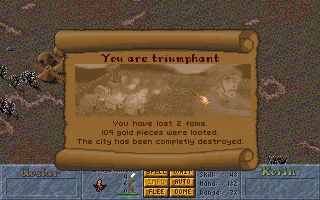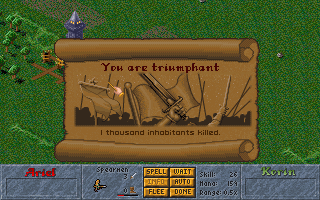Last week, I talked about Eminent Domain and the way in which it recontextualizes imperialism in a fictional science fiction setting. I thought I’d take a look at a game which deals with fictional imperialism using a different set of genre conventions: Simtex’s Master of Magic. This game, published a year after the first Master of Orion game, adapts the 4X-style gameplay of MoO to a fantasy setting that appears to be heavily inspired by Magic: the Gathering.
MoM makes a few interesting moves in terms of rendering the 4X genre. For one, fantasy racism is in full swing, which means the player actually has to contend with ethnic/racial rivalries. The player’s “home race”, determined by the race of the city where their fortress resides, provides a modifier to the unrest suffered when ruling cities of other races. Some races are willing to submit to rule by some overlords but not others. For example, a city populated by High Elves will submit to Nomad conquerors without any special complaint, but there’ll be hell to pay if Dark Elves try to rule them. One particularly interesting example are the Klackons, a race of humanoid ants, who suffer an unrest penalty with everyone, partially because of their hive-mind, but also probably owing to a hefty dose of xenophobia directed at the most alien of sentient races. The Klackons’ unrest penalty, combined with their inability to build advanced religious structures to suppress rebels, means it is often preferable to wipe them off the face of the Earth rather than attempt to subjugate them.
Which brings me to another of MoM’s unusual touches: The game regularly reminds you that the cities you are fighting over are full of people. When you attack or defend a city, the city itself takes up a 4×4 square in the  battle map. Attacking units that enter that area risk killing off large numbers of civilians as they get caught up in the fighting. An after battle summary will inform you how many thousands of civilians were killed in the fighting, as well as any buildings that were destroyed. As alluded to above, it is possible for players to raze cities to the ground rather than attempt to subjugate them–the game punishes this by giving the player “infamy,” which reduces their likelihood of recruiting heroes or mercenaries. This amounts to little more than a slap on the wrist in the grand scheme of things, but it does serve as a reminder to the player that genocide is generally frowned upon, even when it is perpetuated against icky ant people or dark-skinned elves.
battle map. Attacking units that enter that area risk killing off large numbers of civilians as they get caught up in the fighting. An after battle summary will inform you how many thousands of civilians were killed in the fighting, as well as any buildings that were destroyed. As alluded to above, it is possible for players to raze cities to the ground rather than attempt to subjugate them–the game punishes this by giving the player “infamy,” which reduces their likelihood of recruiting heroes or mercenaries. This amounts to little more than a slap on the wrist in the grand scheme of things, but it does serve as a reminder to the player that genocide is generally frowned upon, even when it is perpetuated against icky ant people or dark-skinned elves.
The handling of neutral cities in general has curious nuances. Each continent in the randomly-generated map is usually dominated by one race, which will have numerous cities scattered across it. Neutral cities leave each other alone, but will send raiding parties periodically to attack wizard-controlled cities. Mechanically, these serve to ensure that the player does not completely neglect to garrison their cities. Narratively, I have to wonder if these raiding parties aren’t motivated by superstitious fear of magical practitioners, or a more rational fear that they will be taken over by powerful wizards if they don’t strike first. Either way, having neutral cities send out attacks isn’t strictly necessary from a game design standpoint, as the various ruins and dungeons that dot the landscape also send out wandering monsters to menace the player. It may be that the raiding parties are there to provide the player with an added reason to deal with neutral cities beyond greed or expansionism. They really aren’t much of a threat, though, as the parties are generally so weak that they barely qualify as an annoyance to a prepared player. Still, as pretexts for military action go, even a weak assault is enough to rationalize a decisive counter-attack and either an occupation or salt-the-earth operation.
Overall, I find it interesting that MoM foregrounded the imperialism of the 4X genre as much as it did. The fictionalized nature of the game’s narrative could easily have been used to brush aside notions of subjugation and exploitation. Then again, the pseudo-historicism of the fantasy genre has often been used to starkly depict warfare and oppression, hiding behind the notion of “that’s how things are.” Ultimately, the only way to win Master of Magic is to defeat your opponents and take their magic for yourself. There is no option for a peaceful victory.





